Venezuela: Yukpa Indian leader murdered
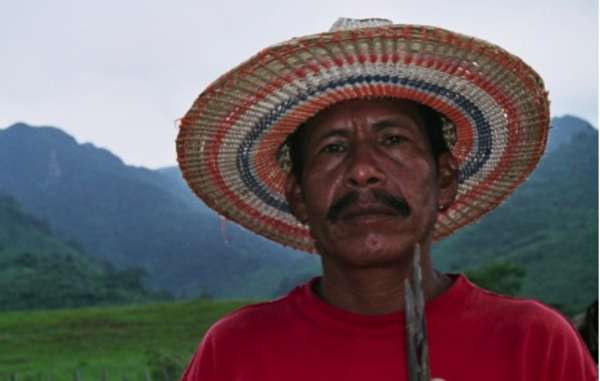
Yukpa leader Sabino Romero was murdered following his campaign for his people's land rights
© Homo et Natura
Sabino Romero, a prominent Yukpa leader and activist was murdered on 3 March in the Sierra de Perijá, the mountainous region of west Venezuela on the border with Colombia.
Venezuela’s State Prosecutors’ office (Fiscalía General) has opened an investigation into the killing. According to them, Sabino was travelling in a vehicle on a road down from the mountains when two men on a motorbike approached the car and fired shots point blank into it. Lucía his wife, who was travelling with him, was injured.
Sabino was one of the most outspoken Yukpa leaders, and had campaigned courageously for Yukpa land rights for many years.
He was constantly threatened by gunmen acting for ranchers who occupy Yukpa land and who oppose the single Yukpa territory he advocated.
In 2009, the authorities jailed Sabino and another Yukpa leader, Alexander Fernandez, in a military prison for one and half years, falsely accusing them of murder and other crimes.
They were eventually released in June 2011 because prosecutors failed to provide any evidence to back the allegations.
Despite numerous requests from the Yukpa and the increasing number of violent conflicts fomented by the ranchers, the authorities have failed to provide any protection for prominent Yukpa spokespeople like Sabino.
Sabino’s daughter Zenaida visited Europe last December, at the invitation of the NGO LAMMP to meet with UN officials and European governments.
During a meeting with a British parliamentarian she said ‘We don’t need the exploitation of mining companies in our territory… We have have been carrying on this fight for years, principally for our ancestral land. We want a free territory, the land of our mother earth.’
According to Venezuelan human rights organization Provea, several Yukpa have been murdered in the last five years, but not one case has been properly investigated by the authorities. Sabino’s father José Manuel was murdered in 2009 allegedly by a rancher occupying Yukpa land.
Despite former President Chavez’s public promises in 2009 that his government would recognize indigenous land rights in the Sierra de Perijá, it has done nothing to resolve the land conflict.
Survival has lobbied the Venezuelan government to act urgently to resolve the conflicts in the Sierra de Perijá and recognize Yukpa land rights.
Lusbi Portillo of local NGO Homo et Natura who has long supported the Yukpa, and opposes coal mining in indigenous territories in the Sierra de Perijá, is also the target of death threats.
Read this online: http://www.survivalinternational.org/news/9014
Indian Supreme Court 'reverses order' to ban 'human safaris'
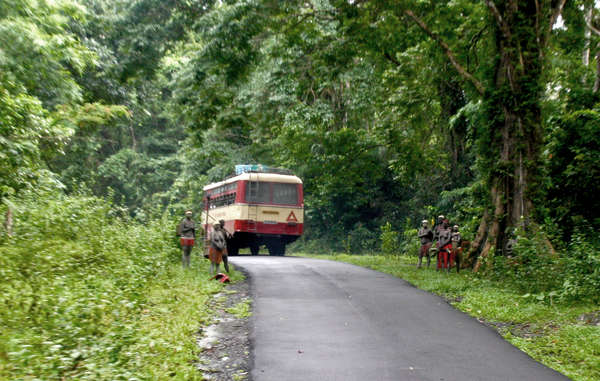
The Supreme Court's refusal to make a ban on tourists traveling along the Andaman Trunk Road permanent has raised renewed fears of the tribe's exploitation.
© Ariberto De Blasoni/Survival
India’s Supreme Court today reportedly reversed its previous ‘interim order’ to ban ‘human safaris’ in the Andaman Islands, dealing a major blow to the campaign against the controversial tours.
Before the interim order, hundreds of tourists traveled along the illegal Andaman Trunk Road every day in the hope of seeing the isolated Jarawa tribe. Tourists used to throw biscuits or force Jarawa women to dance for food. The January order had reduced the number of vehicles entering the Jarawa reserve by around two thirds.
Tour operators in the Andamans are reportedly preparing for the road to be reopened for tourists on Wednesday.
When Enmai, a young Jarawa man, was asked how he felt when outsiders took pictures of him, he said, ‘I don’t feel good. I don’t like it when they take photos from their vehicles.’
The exploitative ‘human safaris’ have been the target of a three-year campaign by Survival International and local organization Search, and caused worldwide outrage after they were exposed in the British Observer newspaper over a year ago.
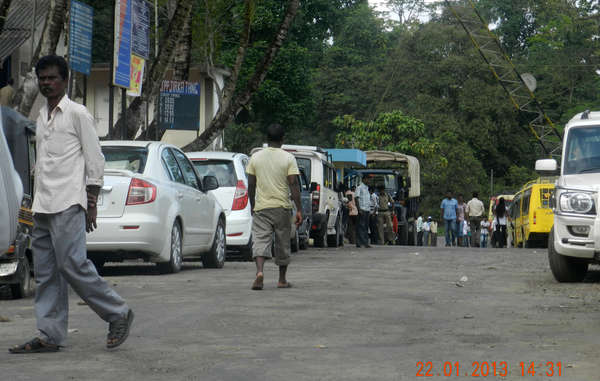
Until the Supreme Court passed an interim order banning tourists from the Andaman Trunk Road, hundreds of vehicles traveled along the road each day.
© Denis Giles/Survival
In a letter to the Supreme Court ahead of the hearing, Survival urged the Court ‘to make the ban on tourists permanent and to order the Andaman Administration to set up an alternative sea route, and to close the road through the Jarawa reserve completely.’ The Court ordered the road to be closed in 2002, but the Andaman authorities have ignored the order.
Alarm bells also rang when the Court reportedly asked the Andaman authorities ‘whether they wanted the Jarawa to be kept in isolation or to be assimilated in the mainstream’. Forcing tribal peoples into the mainstream has disastrous consequences, as rates of disease, depression, addiction and suicide soar.
The government’s official Jarawa policy states that, ‘No attempts to bring them (the Jarawa) to the mainstream society against their conscious will … will be made.’ But Indian politicians have repeatedly called for their mainstreaming.
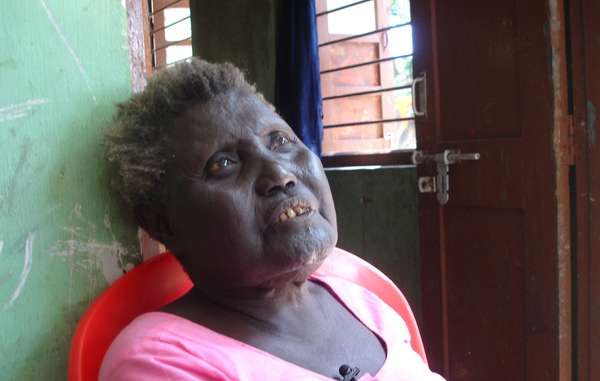
'Mainstreaming' has had a devastating impact on tribal peoples around the world. The Bo were forcibly assimilated by the British, their last member dying in 2010.
© Anvita Abbi/Survival
The Jarawa, not the authorities, should be able to control the amount and type of contact they have with outsiders, and to choose what, if any, changes they make to their way of life. So far, the Jarawa have shown no sign of wanting to leave their forest to join the mainstream.
Survival’s Director Stephen Corry said, ‘This complete volte-face is extremely alarming, and Survival will continue to campaign vigorously and vociferously for the closure of the road. It’s a terrible thought that it’s back to business as usual for the human safaris. Surely the closure of the road to tourists has given everyone in the Andamans a chance to re-think this degrading and disgraceful practice. Human safaris should not be allowed to begin again.’
Note to editors:
- Read Progress Can Kill, a report by Survival International, which documents the catastrophic impact mainstreaming has had on tribal peoples around the world.
- Download Survival’s letter to the Supreme Court (pdf, 49 KB)
Read this online: http://www.survivalinternational.org/news/9008
'Noble Savages': Chagnon's new book triggers resignation and protests
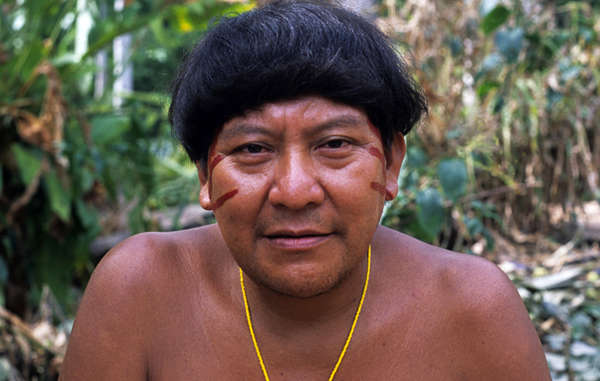
Davi Kopenawa, Yanomami spokesperson and shaman, has spoken out against Napoleon Chagnon's new book 'Noble Savages'.
© Fiona Watson/Survival
A new book by controversial American anthropologist Napoleon Chagnon has triggered a wave of protests among experts and Yanomami Indians:
- Marshall Sahlins, ‘the world’s most respected anthropologist alive today’, has resigned from the US National Academy of Sciences in protest at Chagnon’s election to the Academy. Sahlins previously wrote a devastating critique of Chagnon’s work in the Washington Post.
- Davi Kopenawa, a spokesman for Brazil’s Yanomami and President of the Yanomami association Hutukara, has spoken out about Chagnon’s work: ‘[Chagnon] said about us, ‘The Yanomami are savages!’ He teaches false things to young students. ‘Look, the Yanomami kill each other because of women.’ He keeps on saying this. But what do his leaders do? I believe that some years ago his leader waged a huge war – they killed thousands of children, they killed thousands of girls and boys. These big men killed almost everything. These are the fierce people, the true fierce people. They throw bombs, fire machine guns and finish off with the Earth. We don’t do this…’
- A large group of anthropologists who have each worked with the Yanomami for many years have issued a statement challenging Chagnon’s assessment of the tribe as ‘fierce’ and ‘violent’. They describe the Yanomami as ‘generally peaceable.’
- Survival International’s Director Stephen Corry has said, ’Chagnon’s work is frequently used by writers, such as Jared Diamond and Steven Pinker, who want to portray tribal peoples as ‘brutal savages’ – far more violent than ‘us’. But none of them acknowledge that his central findings about Yanomami ‘violence’ have long been discredited.’
Napoleon Chagnon’s autobiography ‘Noble Savages: My Life Among Two Dangerous Tribes – the Yanomamö and the Anthropologists’, has just been published. His 1968 book ‘Yanomamö: The Fierce People’ portrayed the Yanomami as ‘sly, aggressive and intimidating’, and claimed they ‘live in a state of chronic warfare’. It is still a standard work in undergraduate anthropology.
The Yanomami live in Brazil and Venezuela and are the largest relatively isolated tribe in South America. Their territory is protected by law, but illegal goldminers and ranchers continue to invade their land, destroying their forest and spreading diseases which in the 1980s killed one out of five Brazilian Yanomami.
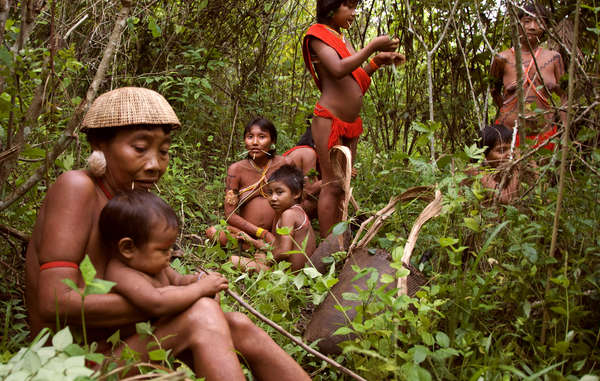
Napoleon Chagnon's view that the Yanomami are 'aggressive and intimidating' and that they 'live in a state of chronic warfare' has been widely discredited.
© Fiona Watson/Survival
Chagnon’s work has had far-reaching consequences for the rights of the Yanomami. In the late 1970s, Brazil’s military dictatorship, which was refusing to demarcate the Yanomami territory, was clearly influenced by the characterization of the Yanomami as hostile to each other and in the 1990s, the UK government refused funding for an education project with the Yanomami, saying that any project with the tribe should work on ‘reducing violence’.
Most recently, Chagnon’s work was cited in Jared Diamond’s highly controversial book ‘The World Until Yesterday’, in which he states that most tribal peoples, including the Yanomami, are ’trapped in cycles of violence and warfare’ and calls for the imposition of state control in order to bring them peace.
Survival International’s Director Stephen Corry said today, ‘The greatest tragedy in this story is that the real Yanomami have largely been written out of it, as the media have chosen to focus only on the salacious details of the debate that rages between anthropologists or on Chagnon’s disputed characterizations. In fact, Yanomamö: The Fierce People had disastrous repercussions both for the Yanomami and tribal peoples in general. There’s no doubt it’s been used against them and it has brought the 19th century myth of the ‘Brutal Savage’ back into mainstream thinking.’
Note to editors:
The full statements and additional information about the controversy can be found here.
Read this online: http://www.survivalinternational.org/news/8997
‘Unprecedented’ suspension of mining on Colombian Indians’ land

Many Embera-Katío have been uprooted by extreme violence that plagues their land.
© Wikipedia
A Colombian judge has suspended mining concessions in an ‘unprecedented move’ to protect Embera-Katío Indians’ land in north-west Colombia.
The decision comes after waves of violence in Alto Andágueda in Colombia’s Chocó department that has uprooted hundreds of indigenous families from their homes.
Violence between illegal insurgents and the army has coincided with the spread of mining to the region, much of it illegal.
The court has now ordered all mining personnel and machinery out of the area until the legality of the concessions can be proven.
A 2011 report by the Colombian government found 63% of the country’s mining concessions are illegal, and in the Chocó department the figure reaches an astonishing 99.2%.
However, Colombia’s President Santos has repeatedly advocated mining as a key priority throughout his term.
An increase in demand and value for metals such as gold, iron, and coltan – used in most electronic devices – has had a huge impact on Colombian Indians.
Thousands have been killed or displaced by armed groups, who often precede the arrival of mining companies.
“(This decision) aims to avoid the continued threat against indigenous peoples’ land rights by the disproportionate use of its resources by outsiders, and the evident violent that is present in the region,’ said the judge.
Read this online: http://www.survivalinternational.org/news/8993

